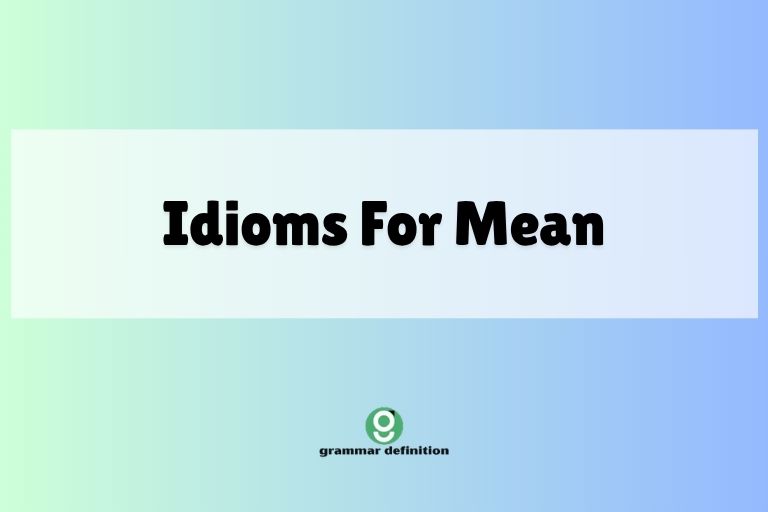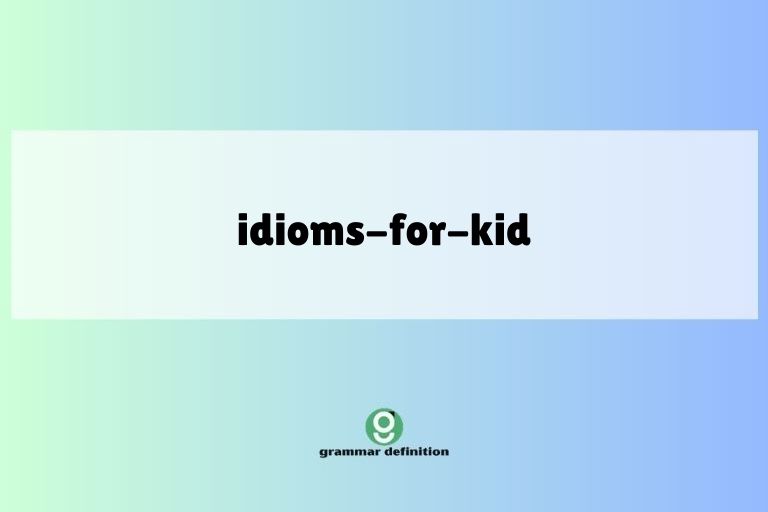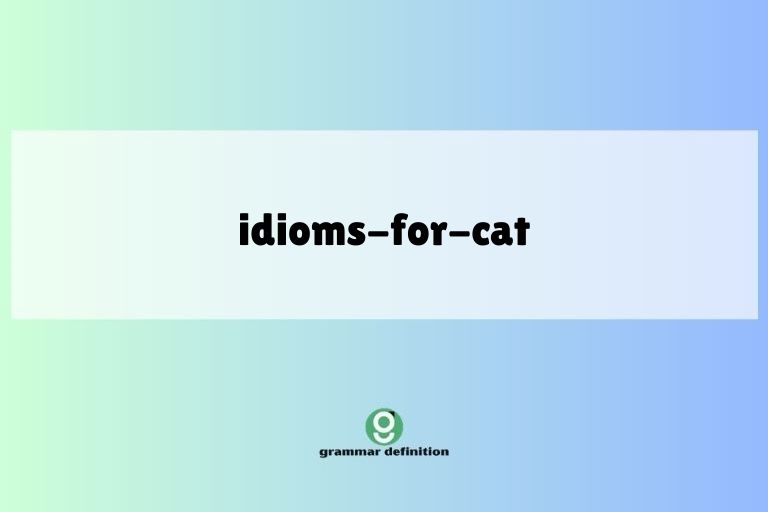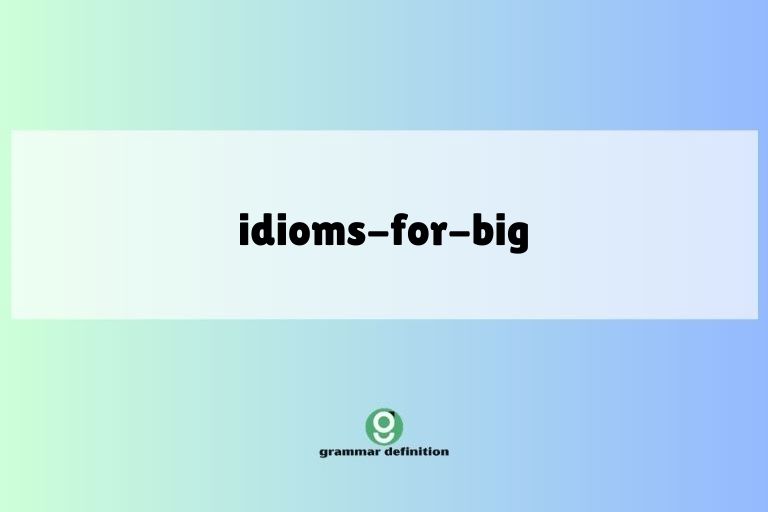Idioms for Snow: Mastering Figurative Language
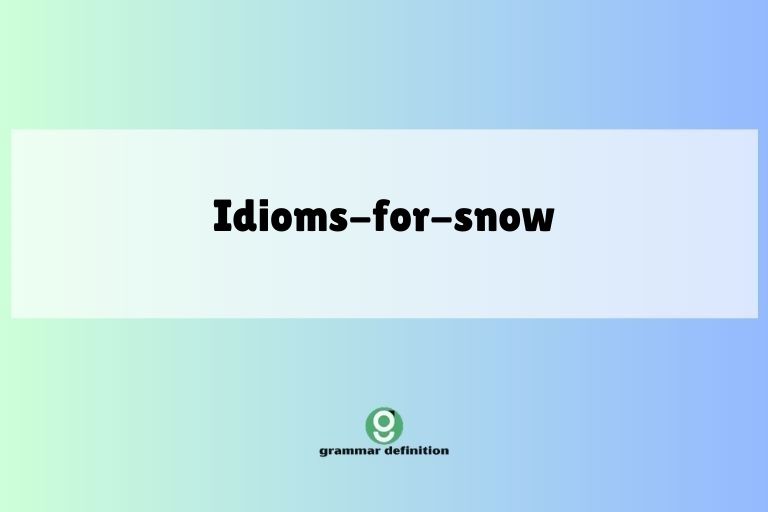
Idioms are an integral part of the English language, adding color and depth to our communication. Understanding idioms, especially those related to weather phenomena like snow, enriches our comprehension and expressive abilities.
This article delves into the fascinating world of snow-related idioms, exploring their meanings, origins, and usage. Whether you’re an English language learner or a native speaker looking to enhance your vocabulary, this guide will equip you with the knowledge and skills to confidently use these idioms in various contexts.
This comprehensive guide is designed for English language learners, teachers, and anyone interested in expanding their knowledge of idiomatic expressions. By the end of this article, you will be able to recognize, understand, and appropriately use a variety of snow-related idioms.
Table of Contents
- Introduction
- Definition of Idioms
- Structural Breakdown of Idioms
- Types and Categories of Snow Idioms
- Examples of Snow Idioms
- White as Snow
- Snowed Under
- Snowball Effect
- Tip of the Iceberg
- Walking on Thin Ice
- Give Someone the Cold Shoulder
- Usage Rules for Snow Idioms
- Common Mistakes with Snow Idioms
- Practice Exercises
- Advanced Topics in Idiomatic Language
- Frequently Asked Questions
- Conclusion
Definition of Idioms
An idiom is a phrase or expression whose meaning cannot be understood from the literal meanings of its individual words. Instead, the phrase has a figurative meaning that is known through common use.
Idioms add color and nuance to language, making it more expressive and engaging. They often reflect cultural values and historical contexts.
Idioms are classified as a type of figurative language, which also includes metaphors, similes, and personification. Their function is to convey meaning in a non-literal way, often to add emphasis or humor.
Idioms are used in both spoken and written English, and their usage varies depending on the context and the audience.
Understanding idioms is crucial for effective communication in English. Without a grasp of idiomatic expressions, it can be difficult to fully comprehend the intended meaning of a message.
Furthermore, using idioms correctly can enhance one’s fluency and make one’s speech or writing sound more natural.
Structural Breakdown of Idioms
Idioms can be structurally diverse, ranging from simple two-word phrases to more complex sentences. The key characteristic of an idiom is that its meaning is not compositional; that is, it cannot be derived from the meanings of its constituent parts.
The structure of an idiom is fixed, meaning that the words cannot be changed or rearranged without altering the meaning or rendering the idiom nonsensical.
Many idioms follow common grammatical patterns, such as verb phrases (e.g., “kick the bucket”), noun phrases (e.g., “a piece of cake”), and prepositional phrases (e.g., “in the nick of time”). However, the idiomatic meaning transcends the literal grammatical structure.
For example, the phrase “break a leg” is a complete sentence, but its idiomatic meaning is “good luck,” which has no direct connection to the literal action of breaking a leg.
The structural analysis of idioms often involves identifying the core components of the phrase and understanding how they contribute to the overall idiomatic meaning. This can be challenging, as the connection between the literal and figurative meanings is often arbitrary and culturally determined.
However, by studying the structure of idioms, learners can gain a better understanding of how they function within the English language.
Types and Categories of Snow Idioms
Snow idioms can be categorized based on their figurative meanings and the contexts in which they are typically used. Here are some common categories:
- Appearance and Purity: Idioms that use snow to describe something as clean, pure, or pristine.
- Overwhelm and Burden: Idioms that use snow to describe being overwhelmed or burdened by something.
- Growth and Accumulation: Idioms that use snow to describe a gradual increase or accumulation.
- Danger and Risk: Idioms that use ice, a frozen form of water, to describe situations that are dangerous or risky.
- Rejection and Coldness: Idioms that use coldness, related to snow and ice, to describe emotional distance or rejection.
Understanding these categories can help learners grasp the underlying meaning of snow idioms and use them appropriately in different situations. Each category reflects a different aspect of snow and its associated imagery, providing a rich source of figurative language.
Examples of Snow Idioms
This section provides a detailed list of snow-related idioms, along with their meanings and example sentences. The idioms are organized by category to facilitate understanding and memorization.
White as Snow
Meaning: Pure, innocent, or clean.
This idiom compares something to the color and perceived purity of snow. It is often used to describe someone’s character or something that is spotless.
The following table provides examples of the idiom “White as Snow” in sentences:
| Example Sentence | Meaning |
|---|---|
| Her conscience is as white as snow. | She is innocent and free from guilt. |
| The freshly laundered sheets were as white as snow. | The sheets were very clean and bright. |
| He claimed his intentions were as white as snow. | He asserted that his motives were pure and honest. |
| The pristine landscape was as white as snow after the blizzard. | The landscape was covered in a blanket of pure white snow. |
| The bride’s dress was as white as snow, symbolizing her purity. | The dress was a very clean white, representing the bride’s innocence. |
| Despite his past mistakes, he wanted to start over with a clean slate, as white as snow. | He wanted to begin again without any marks or blemishes from his past. |
| The newly fallen snow made the entire town look as white as snow. | The town was covered in a fresh, clean layer of snow. |
| Her reputation was once tarnished, but now it’s as white as snow. | Her reputation has been restored to a state of purity and innocence. |
| The cotton fields stretched out, as white as snow, under the summer sun. | The cotton fields were exceptionally white and bright. |
| The fluffy clouds in the sky were as white as snow. | The clouds were a pristine, clean white color. |
| The polar bear’s fur was as white as snow, helping it blend into its surroundings. | The bear’s fur was an extremely pure white color. |
| He tried to present his version of the events as white as snow, but no one believed him. | He attempted to portray his account as completely innocent and pure. |
| The winter wonderland was as white as snow, creating a picturesque scene. | The winter landscape was covered in a blanket of pure white snow. |
| After the argument, they resolved their differences and their relationship was as white as snow again. | Their relationship was restored to a state of purity and harmony. |
| The freshly painted walls of the room were as white as snow. | The walls were painted a very clean and bright white color. |
| She wanted her wedding day to be perfect, with everything as white as snow. | She wanted her wedding day to be pristine and flawless. |
| The angel’s wings were depicted as white as snow in the painting. | The angel’s wings were portrayed as a pure and radiant white. |
| The doctor assured her that her blood tests came back as white as snow, indicating good health. | The blood tests showed no signs of any health problems. |
| The new policy was designed to ensure that all transactions were as white as snow and completely transparent. | The policy aimed to make all transactions honest and open. |
| The mountain peaks were as white as snow, even in the summer months. | The mountain peaks remained covered in a pure white snow. |
| He presented his alibi as white as snow, but the detective remained skeptical. | He presented his alibi as completely innocent, but the detective was not convinced. |
| The research paper was as white as snow, with no evidence of plagiarism. | The research paper was original and free from any copied material. |
| The company’s annual report aimed to show that their financial practices were as white as snow. | The report tried to demonstrate that their financial practices were ethical and transparent. |
| The baby’s skin was as white as snow, soft and delicate. | The baby’s skin was very fair and pure. |
Snowed Under
Meaning: To be overwhelmed with a large amount of work or responsibilities.
This idiom uses the image of being buried under a heavy snowfall to describe being overburdened with tasks.
The following table provides examples of the idiom “Snowed Under” in sentences:
| Example Sentence | Meaning |
|---|---|
| I’m completely snowed under with paperwork this week. | I have an excessive amount of paperwork to deal with. |
| She’s been snowed under since the project deadline was moved up. | She has been overwhelmed with work since the deadline changed. |
| The customer service team is snowed under with complaints. | The team is dealing with a large number of customer complaints. |
| With the holiday season approaching, the bakery was snowed under with orders. | The bakery had an overwhelming number of orders to fulfill for the holidays. |
| He was snowed under with emails after returning from his vacation. | He had an excessive amount of emails to catch up on after his time off. |
| The small business was snowed under with support requests after their product went viral. | The business was overwhelmed with a large number of requests for help. |
| The accounting department is snowed under during tax season. | The department has an excessive workload during tax season. |
| She felt snowed under by the responsibilities of being a new parent. | She felt overwhelmed by the numerous tasks and duties of caring for a newborn. |
| The volunteers were snowed under with donations after the natural disaster. | The volunteers received an overwhelming amount of donated items. |
| The library staff was snowed under with requests for the latest bestseller. | The staff was dealing with a large number of requests for the popular book. |
| He’s been completely snowed under with preparations for the upcoming conference. | He’s been extremely busy with all the arrangements for the conference. |
| The IT department is snowed under with tickets regarding the new software update. | The IT department is managing a large number of issues related to the update. |
| The marketing team was snowed under with tasks related to the new product launch. | The marketing team had an overwhelming amount of work for the product launch. |
| She was snowed under with wedding planning tasks, from venue selection to catering. | She was overwhelmed with all the details and arrangements for her wedding. |
| The small coffee shop was snowed under with customers on a Saturday morning. | The coffee shop was extremely busy with a large number of customers. |
| He’s snowed under with applications to review for the scholarship program. | He has an overwhelming number of applications to assess. |
| The construction crew was snowed under with projects after the storm damage. | The crew had a large number of jobs to handle because of the storm. |
| She felt snowed under by the expectations placed on her at work. | She felt overwhelmed by the demands and pressures of her job. |
| The research team was snowed under with data to analyze for their study. | The team had an overwhelming amount of data to process for their research. |
| The event planners were snowed under with last-minute changes and requests. | The planners had a large number of sudden changes and demands to manage. |
| The customer support hotline was snowed under with calls during the product recall. | The hotline received an excessive number of calls related to the recall. |
| He was snowed under with requests to speak at various industry events. | He received an overwhelming number of invitations to speak at events. |
| The legal team was snowed under with paperwork related to the merger. | The team had an excessive amount of documents to handle for the merger. |
| She felt snowed under by the sheer volume of information she had to learn for the exam. | She felt overwhelmed by the amount of knowledge she needed to acquire. |
Snowball Effect
Meaning: A situation in which something initially small grows rapidly and becomes larger and more significant.
This idiom refers to how a snowball rolling down a hill accumulates more snow and becomes bigger and faster.
The following table provides examples of the idiom “Snowball Effect” in sentences:
| Example Sentence | Meaning |
|---|---|
| The company’s initial success led to a snowball effect, with profits increasing exponentially. | The company’s early success caused rapid growth and increased profits. |
| One small mistake can create a snowball effect, leading to major problems. | A minor error can escalate into significant issues. |
| The positive publicity created a snowball effect, attracting new customers. | The good publicity led to a rapid increase in customers. |
| The initial investment in renewable energy had a snowball effect, encouraging more sustainable practices. | The first investment led to a growing trend of eco-friendly initiatives. |
| The spread of the rumor had a snowball effect, quickly reaching every corner of the office. | The rumor spread rapidly and extensively. |
| The increased interest in fitness created a snowball effect, with more people joining gyms. | The growing interest in exercise led to more people signing up for gym memberships. |
| The small act of kindness had a snowball effect, inspiring others to do good deeds. | The kind act led to a growing wave of generosity and goodwill. |
| The initial delay in the project caused a snowball effect, pushing back the entire timeline. | The first delay had a cascading effect, impacting all subsequent deadlines. |
| The campaign’s early success created a snowball effect, generating more donations and support. | The campaign’s initial positive results led to a surge in donations and backing. |
| The negative feedback had a snowball effect, damaging the company’s reputation. | The negative reviews accumulated and significantly harmed the company’s image. |
| The viral video created a snowball effect, attracting millions of views in a short time. | The video spread rapidly and gained a massive number of views. |
| The initial cost savings had a snowball effect, improving the company’s financial performance. | The early savings led to an overall improvement in the company’s finances. |
| The continuous learning and development had a snowball effect, enhancing their skills and confidence. | The ongoing training led to a consistent improvement in their abilities and self-assurance. |
| The environmental initiative had a snowball effect, encouraging more sustainable practices within the community. | The eco-friendly project prompted a growing trend of environmentally conscious behaviors. |
| The increased traffic to the website had a snowball effect, boosting online sales. | The higher traffic numbers resulted in a surge in online purchases. |
| The small upgrade to the software had a snowball effect, improving overall system performance. | The minor enhancement led to significant improvements in the system’s efficiency. |
| The initial success of the startup had a snowball effect, attracting investors and partners. | The startup’s early achievements led to increased interest from investors and collaborators. |
| The improvements in employee morale had a snowball effect, increasing productivity and teamwork. | The better mood among employees led to higher output and cooperation. |
| The small marketing campaign had a snowball effect, increasing brand awareness and customer engagement. | The modest advertising effort resulted in greater recognition and interaction with customers. |
| The initial reduction in waste had a snowball effect, promoting a culture of sustainability in the organization. | The first steps towards cutting waste led to a broader adoption of eco-friendly practices. |
| The positive impact of the mentorship program had a snowball effect, fostering future leaders. | The success of the mentoring program led to the development of new leaders. |
| The initial innovation had a snowball effect, driving further advancements in technology. | The first breakthrough led to a series of technological improvements. |
| The increased engagement with the community had a snowball effect, improving the company’s reputation. | The enhanced interaction with the community led to a better public image for the company. |
| The small improvement in customer service had a snowball effect, increasing customer loyalty. | The slight enhancement in service led to greater customer commitment. |
Tip of the Iceberg
Meaning: Only a small, visible part of a much larger problem or situation.
This idiom refers to the fact that only a small portion of an iceberg is visible above the water, with the majority hidden beneath the surface.
The following table provides examples of the idiom “Tip of the Iceberg” in sentences:
| Example Sentence | Meaning |
|---|---|
| The financial irregularities we discovered are just the tip of the iceberg. | The problems we found are likely much larger and more extensive. |
| His anger was the tip of the iceberg; underneath, he was deeply hurt. | His anger was a visible sign of deeper emotional pain. |
| The complaints we’ve received are just the tip of the iceberg; many more customers are unhappy. | The complaints we’ve heard represent a larger number of dissatisfied customers. |
| The minor technical issues we’ve identified are likely just the tip of the iceberg. | There are likely more significant technical problems that we haven’t discovered yet. |
| The few reported cases of fraud are just the tip of the iceberg in this widespread scam. | The known instances of fraud represent a small fraction of the overall fraudulent activity. |
| The environmental damage we can see is just the tip of the iceberg; the long-term effects are unknown. | The visible environmental harm is minimal compared to the potentially larger, hidden impacts. |
| The challenges we’ve faced so far are just the tip of the iceberg compared to what lies ahead. | The difficulties we’ve encountered are minor compared to the greater challenges we will face. |
| The surface-level improvements are just the tip of the iceberg; real change requires deeper reforms. | The visible enhancements are superficial; true progress requires fundamental changes. |
| The symptoms he’s experiencing are just the tip of the iceberg; he needs a thorough medical examination. | His symptoms are indicative of a potentially more serious, underlying health issue. |
| The information we’ve gathered is just the tip of the iceberg; there’s much more to uncover. | We’ve only scratched the surface, and there’s significantly more information to be found. |
| The occasional disagreements are just the tip of the iceberg; the underlying tensions run deep. | The visible conflicts are a sign of more profound, unresolved issues. |
| The initial budget cuts are just the tip of the iceberg; more severe financial constraints are expected. | The current reductions are minimal compared to the more significant financial restrictions anticipated. |
| The reported incidents of bullying are just the tip of the iceberg; many cases go unreported. | The known instances of bullying represent a fraction of the actual problem. |
| The visible signs of stress are just the tip of the iceberg; he’s under immense pressure. | The outward manifestations of stress are indicative of a more substantial, internal burden. |
| The short-term challenges are just the tip of the iceberg compared to the long-term implications. | The immediate difficulties are minor compared to the potential long-range consequences. |
| The visible progress is just the tip of the iceberg; substantial work remains to be done. | The apparent advancements are superficial, and much more effort is required. |
| The few complaints they received are just the tip of the iceberg; many customers are silently dissatisfied. | The number of complaints is not representative of the larger number of unhappy customers. |
| The visible signs of environmental damage are just the tip of the iceberg; the unseen effects are more concerning. | The observable environmental harm is minimal compared to the hidden, more worrying consequences. |
| The reported instances of data breaches are just the tip of the iceberg; many go undetected. | The known cases of data breaches are a small part of a larger, more pervasive problem. |
| The improvements to the building are just the tip of the iceberg; a complete renovation is necessary. | The upgrades are superficial, and a full-scale refurbishment is needed. |
| The information available to the public is just the tip of the iceberg; much more is hidden. | The accessible information is a small portion of a larger, concealed body of knowledge. |
| The few visible stars are just the tip of the iceberg; the universe is vast and largely unexplored. | The visible stars are a small part of the much larger, unknown universe. |
| The known historical facts are just the tip of the iceberg; much of history remains undiscovered. | The recorded historical information is a small portion of the larger, unknown historical narrative. |
| The skills they have demonstrated are just the tip of the iceberg; they have immense potential. | The abilities they have shown are a small part of their overall capabilities. |
Walking on Thin Ice
Meaning: To be in a risky or precarious situation.
This idiom uses the image of walking on a frozen lake with thin ice, where there is a risk of falling through.
The following table provides examples of the idiom “Walking on Thin Ice” in sentences:
| Example Sentence | Meaning |
|---|---|
| He’s walking on thin ice after his recent mistakes at work. | He is in a precarious position due to his errors. |
| By lying to her parents, she’s walking on thin ice. | She is in a risky situation because she lied. |
| The company is walking on thin ice due to its financial problems. | The company is in a vulnerable state because of its finances. |
| He’s walking on thin ice by continuing to ignore the project deadlines. | He is in a risky position by not meeting the required timelines. |
| She’s walking on thin ice by constantly arguing with her boss. | She is in a precarious situation because of her frequent disagreements. |
| The team is walking on thin ice after losing several key players. | The team is in a vulnerable position due to the loss of important members. |
| The politician is walking on thin ice after the scandal broke. | The politician is in a risky situation due to the recent controversy. |
| The company is walking on thin ice by not investing in new technology. | The company is in a precarious position by failing to innovate. |
| He knew he was walking on thin ice when he started making promises he couldn’t keep. | He knew he was in a risky situation when he made unrealistic commitments. |
| She’s walking on thin ice by bending the rules to get ahead. | She is in a precarious situation by not following the regulations. |
| The country is walking on thin ice due to its unstable political climate. | The country is in a vulnerable position because of its political instability. |
| He’s walking on thin ice by continuously arriving late to meetings. | He is in a risky situation by being consistently tardy. |
| The organization is walking on thin ice due to its declining membership numbers. | The organization is in a precarious position because of the decreasing number of members. |
| She’s walking on thin ice by ignoring the customer complaints. | She is in a risky situation by not addressing the concerns of the customers. |
| The startup is walking on thin ice due to its lack of funding. | The startup is in a vulnerable position because of its financial constraints. |
| He’s walking on thin ice by making personal calls during work hours. | He is in a risky situation by using company time for personal matters. |
| The relationship is walking on thin ice after the recent arguments. | The relationship is in a vulnerable state due to the recent conflicts. |
| She’s walking on thin ice by not following the safety protocols. | She is in a risky situation by disregarding the safety guidelines. |
| The project is walking on thin ice due to the budget overruns. | The project is in a precarious position because of the excess spending. |
| He’s walking on thin ice by gossiping about his colleagues. | He is in a risky situation by spreading rumors about his coworkers. |
| The business is walking on thin ice by not adapting to market changes. | The business is in a vulnerable position by not evolving with the market trends. |
| She’s walking on thin ice by not meeting her sales targets. | She is in a risky situation by not achieving her sales objectives. |
| The government is walking on thin ice due to the rising unemployment rates. | The government is in a precarious position because of the increasing joblessness. |
| He’s walking on thin ice by criticizing his superiors in public. | He is in a risky situation by openly criticizing his bosses. |
Give Someone the Cold Shoulder
Meaning: To deliberately ignore someone or treat them in an unfriendly way.
This idiom suggests a deliberate act of rejection or indifference, as if turning a “cold shoulder” towards someone.
The following table provides examples of the idiom “Give Someone the Cold Shoulder” in sentences:
| Example Sentence | Meaning |
|---|---|
| She gave him the cold shoulder after their argument. | She deliberately ignored him after they argued. |
| He’s been giving me the cold shoulder ever since I disagreed with him. | He has been treating me in an unfriendly way since our disagreement. |
| They gave the new employee the cold shoulder, making her feel unwelcome. | They deliberately ignored the new employee, making her feel excluded. |
| She gave him the cold shoulder at the party after finding out about his lie. | She deliberately ignored him at the party after discovering his deception. |
| He’s been giving her the cold shoulder since she got the promotion he wanted. | He has been treating her in an unfriendly way since she received the promotion. |
| They gave the visiting team the cold shoulder, creating a hostile environment. | They deliberately ignored the visiting team, creating an unwelcoming atmosphere. |
| She gave her ex-boyfriend the cold shoulder when they ran into each other at the restaurant. | She deliberately ignored her former partner when they encountered each other. |
| He’s been giving the new neighbors the cold shoulder because they’re different. | He has been treating the new neighbors in an unfriendly way because they are different. |
| They gave the proposal the cold shoulder, rejecting it without proper consideration. | They deliberately ignored the proposal, dismissing it without careful thought. |
| She gave her sister the cold shoulder after their disagreement over the inheritance. | She deliberately ignored her sister following their dispute over the inheritance. |
| He’s been giving his colleague the cold shoulder because he feels threatened by his success. | He has been treating his colleague in an unfriendly way because he feels intimidated. |
| They gave the new policy the cold shoulder, refusing to implement it properly. | They deliberately ignored the new policy, failing to enforce it correctly. |
| She gave the telemarketer the cold shoulder by hanging up immediately. | She deliberately ignored the telemarketer by ending the call abruptly. |
| He’s been giving his parents the cold shoulder because he’s angry at them. | He has been treating his parents in an unfriendly way because he is upset with them. |
| They gave the suggestion the cold shoulder, dismissing it during the brainstorming session. | They deliberately ignored the suggestion, rejecting it during the meeting. |
| She gave her former friend the cold shoulder after their falling out. | She deliberately ignored her former friend after their argument. |
| He’s been giving the new intern the cold shoulder because he thinks he’s better than them. | He has been treating the new intern in an unfriendly way because he feels superior. |
| They gave the environmental concerns the cold shoulder, prioritizing profit over sustainability. | They deliberately ignored the environmental issues, focusing on financial gain. |
| She gave her noisy neighbors the cold shoulder by avoiding them at all costs. | She deliberately ignored her loud neighbors by avoiding them entirely. |
| He’s been giving his teammate the cold shoulder because he blames him for the loss. | He has been treating his teammate in an unfriendly way because he holds him responsible. |
| They gave the customer feedback the cold shoulder, failing to address their concerns. | They deliberately ignored the customer comments, neglecting to resolve their issues. |
| She gave the beggar the cold shoulder, walking past without acknowledging him. | She deliberately ignored the beggar, passing by without recognizing him. |
| He’s been giving the advice the cold shoulder, refusing to listen to anyone. | He has been treating the counsel in an unfriendly way, rejecting all suggestions. |
| They gave the warning signs the cold shoulder, ignoring the potential dangers. | They deliberately ignored the warning signals, disregarding the possible risks. |
Usage Rules for Snow Idioms
Using idioms correctly requires understanding their specific meanings and the contexts in which they are appropriate. Here are some general rules to follow:
- Understand the meaning: Ensure you fully understand the figurative meaning of the idiom before using
it. Using an idiom without knowing its true meaning can lead to miscommunication.
- Consider the context: Idioms are often informal and may not be appropriate for all situations. Consider the audience and the purpose of your communication before using an idiom.
- Use them sparingly: While idioms can add color to your language, overusing them can make your speech or writing sound unnatural. Use them judiciously to enhance your message.
- Be aware of regional variations: Some idioms are more common in certain regions or dialects. Be mindful of your audience and choose idioms that are widely understood.
- Avoid mixing idioms: Mixing idioms can create nonsensical or humorous effects, but it is generally best to avoid doing so unintentionally.
Common Mistakes with Snow Idioms
Using idioms incorrectly is a common mistake among English language learners. Here are some pitfalls to avoid:
- Literal interpretation: Interpreting idioms literally instead of understanding their figurative meanings.
- Incorrect word order: Changing the word order of an idiom, which can alter its meaning or make it nonsensical.
- Using the wrong idiom: Selecting an idiom that is similar in meaning but not quite appropriate for the context.
- Overusing idioms: Using too many idioms in a single conversation or piece of writing, which can sound unnatural.
- Ignoring regional variations: Using idioms that are not commonly understood in the region where you are communicating.
Here are some examples of common mistakes with snow idioms:
- Incorrect: He is snowing under with work.
Correct: He is snowed under with work. - Incorrect: The problem is only the peak of the iceberg.
Correct: The problem is only the tip of the iceberg. - Incorrect: She gave me a frozen shoulder.
Correct: She gave me the cold shoulder.
Practice Exercises
Test your understanding of snow idioms with these exercises. Fill in the blanks with the appropriate idiom from the list below:
Idiom List:
- White as snow
- Snowed under
- Snowball effect
- Tip of the iceberg
- Walking on thin ice
- Give someone the cold shoulder
- The company is _______________ due to the recent economic downturn.
- The initial success of the marketing campaign created a _______________.
- The evidence we have is just the _______________; there is much more to uncover.
- After their argument, she decided to _______________ him.
- Her reputation is _______________ after the scandal.
- I am completely _______________ with work this week because of the new project.
Answers:
- The company is walking on thin ice due to the recent economic downturn.
- The initial success of the marketing campaign created a snowball effect.
- The evidence we have is just the tip of the iceberg; there is much more to uncover.
- After their argument, she decided to give someone the cold shoulder him.
- Her reputation is white as snow after the scandal.
- I am completely snowed under with work this week because of the new project.
Advanced Topics in Idiomatic Language
For those interested in delving deeper into the study of idioms, here are some advanced topics to explore:
- Etymology of idioms: Researching the origins and historical development of specific idioms.
- Cross-cultural comparisons: Examining how idioms vary across different languages and cultures.
- Cognitive linguistics: Studying the mental processes involved in understanding and using idioms.
- Idioms in literature: Analyzing how idioms are used in literary works to create specific effects.
- Computational linguistics: Developing algorithms and models for automatically identifying and interpreting idioms in text.
Frequently Asked Questions
What is the difference between an idiom and a proverb?
An idiom is a phrase whose meaning is not predictable from the usual meanings of its constituent elements, while a proverb is a short, well-known saying that expresses a general truth or piece of advice.
How can I improve my understanding of idioms?
Read widely, listen to native speakers, and practice using idioms in context. Pay attention to how idioms are used in different situations and make a note of any new idioms you encounter.
Are idioms the same in all English-speaking countries?
No, idioms can vary significantly between different English-speaking countries and regions. Some idioms are specific to certain dialects or cultures.
Can I create my own idioms?
While it is possible to create new phrases, they will not be considered idioms until they are widely adopted and understood by a community of speakers.
Conclusion
Mastering snow idioms is a valuable skill for anyone looking to improve their English language proficiency. By understanding the meanings, origins, and usage rules of these colorful expressions, you can enhance your communication skills and gain a deeper appreciation for the richness and complexity of the English language.
Keep practicing and exploring new idioms to continue expanding your vocabulary and fluency.


